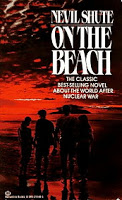

| Visitors Now: | |
| Total Visits: | |
| Total Stories: |

| Story Views | |
| Now: | |
| Last Hour: | |
| Last 24 Hours: | |
| Total: | |
“On The Beach”; A Comment
From Australia, survivors detect a mysterious and incomprehensible Morse code radio signal originating from the United States. With hope that some life has remained in the contaminated regions, one of the last American nuclear submarines, the USS Scorpion, placed by its captain under Australian naval command, is ordered to sail north from its port of refuge in Melbourne (Australia’s southernmost major mainland city) to try to contact whoever is sending the signal. In preparation for this long journey the submarine first makes a shorter trip to some port cities in northern Australia including Cairns, Queensland and Darwin, Northern Territory, finding no suvivors.
The Australian government makes arrangements to provide its citizens with free suicide pills and injections, so that they will be able to avoid prolonged suffering from radiation sickness. One of the novel’s poignant dilemmas is that of Australian naval officer Peter Holmes, who has a baby daughter and a naive and childish wife, Mary, who is in denial about the impending disaster. Because he has been assigned to travel north with the Americans, Peter must try to explain to Mary how to euthanize their baby and kill herself with the pill should he be killed on the ocean voyage.
The characters make their best efforts to “enjoy” what time and pleasures remain to them before dying from radiation poisoning, speaking of small pleasures and continuing their customary activities, allowing their awareness of the coming end to impinge on their minds only long enough to plan ahead for their final hours. The Holmeses plant a garden that they will never see; Moira takes classes in typing and shorthand; scientist John Osborne and others organize a dangerous motor race that results in the violent deaths of several participants. In the end, Captain Towers chooses not to remain with Moira but rather to lead his crew on a final mission to scuttle their submarine beyond the twelve-mile (22 km) limit, so that she will not rattle about, unsecured, in a foreign port, refusing to allow his coming demise to turn him aside from his duty and acting as a pillar of strength to his crew.
Typically for a Shute novel, the characters avoid the expression of intense emotions and do not mope or indulge in self-pity. They do not, for the most part, flee southward as refugees but rather accept their fate once the lethal radiation levels reach the latitudes at which they live. Finally, most of the Australians do opt for the government-promoted alternative of suicide when the symptoms of radiation-sickness appear.”
We will survive as a people, however different the world may change from today. What’s important is how each of us face what’s coming. Accepting the inevitable, that there really is no escape, and nowhere to escape to, frees us to determine how we face our fate; with dignity, on our feet and not on our knees; as free human beings, not as slaves. Enjoy life now, while you can; don’t put anything off for some future time which may never come. Appreciate your loved ones, let them know you love them. See the pleasures of a sunset, enjoy a happy greeting from the dog, or the smell of a cake baking. Enjoy the rain. Say hello to a neighbor. Help a homeless person. Value each moment. All these countless things sum up the totality of our lives, so much of which we take for granted and ignore. These are the basic core of our “humanity”. Time is short, and the destructive process is accelerating. Go to the sea, watch the waves crashing, the sea gulls flying, and greet everyone there, because we are all on the beach…
Source:



